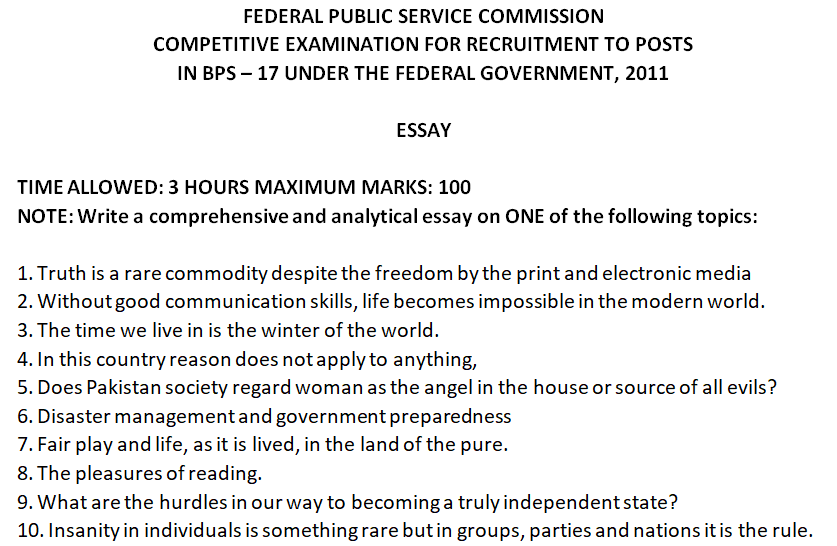CSS Essay Paper 2011
- Truth is a rare commodity despite the freedom by the print and electronic media
- Without good communication skills, life becomes impossible in the modern world.
- The time we live in is the winter of the world.
- In this country reason does not apply to anything,
- Does Pakistan society regard women as the angels in the house or the source of all evils?
- Disaster management and Government Preparedness
- Fair play and life, as it is lived, in the land of the pure.
- The pleasures of reading.
- What are the hurdles in our way to becoming a truly independent state?
- Insanity in individuals is something rare but in groups, parties, and nations it is the rule.
Summaries of Essays:
Here are simplified summaries of the additional essays:
1. Truth is a Rare Commodity Despite the Freedom by the Print and Electronic Media
This essay discusses how, despite the freedom of the press and media in many countries, truth is often distorted or hidden. The writer highlights the role of sensationalism, bias, and political influence in shaping media narratives, making it difficult for the public to access factual information.
2. Without Good Communication Skills, Life Becomes Impossible in the Modern World
This essay argues that effective communication is essential in today’s world, where interaction, collaboration, and understanding are key to success. The writer stresses that strong communication skills are necessary for personal, professional, and social interactions, and without them, individuals may struggle to navigate life.
3. The Time We Live in is the Winter of the World
This essay compares the current state of the world to winter, symbolizing a period of decline, hardship, and uncertainty. The writer discusses global challenges such as conflict, environmental destruction, and social decay, suggesting that society is facing a metaphorical “winter” that requires collective effort to overcome.
4. In This Country, Reason Does Not Apply to Anything
This essay critiques a lack of rational thinking and logical decision-making in society. It highlights how often emotions, biases, and traditions override reason, especially in politics and governance. The writer calls for a more logical and reasoned approach to addressing societal issues and making decisions.
5. Does Pakistani Society Regard Women as Angels in the House or the Source of All Evils?
This essay examines the contradictory views of women in Pakistan, where they are either idealized as perfect homemakers or blamed for societal problems. The writer explores how cultural, religious, and social factors contribute to these conflicting perceptions and advocates for a more balanced and respectful view of women.
6. Disaster Management and Government Preparedness
This essay discusses the importance of effective disaster management systems and the role of government in preparing for natural and man-made disasters. It emphasizes the need for proper infrastructure, early warning systems, and public education to mitigate the impact of disasters and save lives.
7. Fair Play and Life, as It Is Lived, in the Land of the Pure
This essay focuses on the challenges of achieving fairness and justice in Pakistan, often referred to as the “Land of the Pure.” The writer criticizes corruption, inequality, and the lack of transparency, which hinder fair play in both the political and social systems, and calls for reforms to ensure justice for all citizens.
8. The Pleasures of Reading
This essay highlights the joys and benefits of reading, from intellectual enrichment to emotional satisfaction. The writer explains how reading expands knowledge, improves language skills, and provides an escape from daily challenges. The essay encourages a love for books and lifelong learning.
9. What Are the Hurdles in Our Way to Becoming a Truly Independent State?
This essay examines the obstacles Pakistan faces in achieving true independence, beyond political sovereignty. The writer highlights issues such as economic dependency, foreign influence, corruption, and lack of strong institutions that hinder the country’s ability to make independent decisions for its future.
10. Insanity in Individuals is Something Rare, but in Groups, Parties, and Nations It is the Rule
This essay discusses the idea that irrational behavior, or “insanity,” is uncommon in individuals but becomes more common in groups, political parties, and entire nations. The writer explains how collective ideologies, nationalism, and groupthink often lead to decisions that are illogical, harmful, or destructive.
